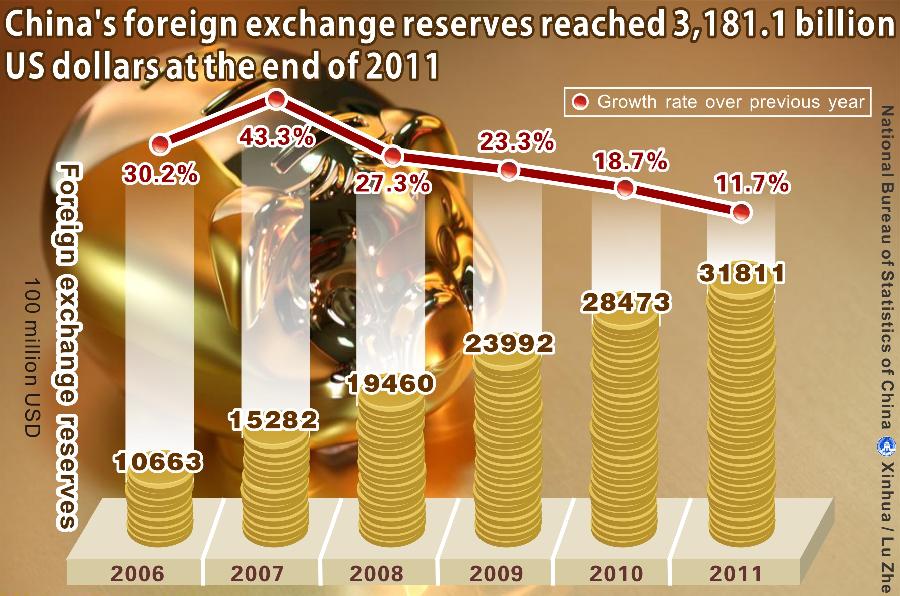
China’s Foreign Exchange Reserves Hit $3.4 Trillion
2014: $4.4 trillion USD
2013: $3.8 trillion USD
2012: $3.4 trillion USD
China is once again facing heavy capital inflows after its foreign exchange reserves posted their biggest quarterly increase since the second quarter of 2011.
Reserves jumped $130 billion to $3.44 trillion in the first quarter, helping to fuel a surge in credit growth amid concerns about the level of debt in the economy.
The increase marks a sharp reversal from last year when money exited China. The return of cash from abroad helped stoke fast credit growth in the first quarter, according to the government. Total new financing in the economy increased 58 per cent to Rmb6.2 trillion ($1 trillion) compared to the first three months of 2012.
Fitch this week cut China’s sovereign credit rating – the first such move by a major international agency since 1999 – on worries that local governments and companies had racked up too much debt.
The rating agency also raised concern about the rise in shadow banking, which continued apace in the first quarter. The increase in outstanding bank loans was moderate at 16 per cent year on year, but credit outside the formal banking system, including trust loans and corporate bonds, more than doubled.
(Read More: Shadow Banking Facing Tougher Regulations)
“The rise in foreign exchange reserves is a very clear sign that capital inflows are back,” said Shen Jianguang, an economist with Mizuho Securities. “We will see more and more worries about this in the coming months because of the massive money printing in the US and Japan.”
Large bond-buying programs by the US Federal Reserve and the Bank of Japan are expanding the money supplies in both countries, generating cash that in part could wind up in emerging markets such as China. The People’s Bank of China has stepped up liquidity withdrawals over the past two months to blunt the inflationary effect of the inflows.
Beijing has strict capital controls to prevent unwanted speculative inflows. But major discrepancies in Chinese export data published on Wednesday pointed to one of the ways in which investors have been sneaking money past the regulators.
(Read More: ‘Absurd’ Chinese Trade Data Confound Analysts)
Chinese exports to the world rose 10 per cent but those to Hong Kong rose 93 per cent in March, which analysts said was an indication of how companies have been over-billing in order to bring more money into China.
Lu Ting, an economist with Bank of America Merrill Lynch, said the strong credit figures might add to fears about inflation, government debt and shadow banking.
Zhou Xiaochuan, the central bank governor, said last month he was on “high alert” about inflation
Mr Lu said: “China’s monetary policy makers are in a tough position to balance short-term growth-stability, market worries, and long-term economic health.”
China’s economic growth bottomed out at 7.4 per cent year on year in the third quarter of 2012. It rebounded to 7.9 percent in the final three months of last year and is expected to have narrowly topped that pace in the first quarter this year. The latest growth data will be published on Monday.
中国央行11日公布,截至2013年3月末,国家外汇存底余额为3兆4400亿美元,与2012年末相比,一季增加约1300亿美元,相当于去年全年外汇存底的增幅,为2011年二季以来单季增量新高,显示海外资金流入中国的势头再度升温,外汇存底规模稳居世界首位。另据英国「金融时报」(Financial Times)报导,中国外汇存底已相当于德国经济的总量。
List of sovereign states by foreign-exchange reserves
1 People’s Republic of China 3,312,000 Dec 2012[1]
2 Japan 1,258,809 Feb 2013[2]
Eurozone.svg Eurozone 881,963 Feb 2013[2]
3 Saudi Arabia 626,800 Dec 2012[1]
4 Russia 527,708 Mar 2013[3]
5 Switzerland 522,187 Feb 2013[2]
6 Republic of China (Taiwan) 403,170 Dec 2012[4]
7 Brazil 373,742 Feb 2013[2]
8 Republic of Korea 327,395 Feb 2013[2]
9 Hong Kong 304,774 Feb 2013[2]
10 India 290,912 Feb 2013[2]

北京时间5月7日,中国人民银行公布中国4月外汇储备30295.3亿美元,预期30200亿美元,前值30091亿美元。外汇储备连续第三个月上升,为2014年6月来首次。
数据显示,中国4月外汇储备较3月增加204亿美元。3月外汇储备30091亿美元。、
中国4月外汇储备22100亿SDR,前值22177.04亿SDR。
中国4月末黄金储备报750.19亿美元,3月末为737亿美元。
2017.01.07
Chinese FOREX is now 3 trillion USD.
截至2016年12月31日,中国外汇储备规模为30105.17亿美元,较去年11月底下降410.81亿美元,2016年全年下降3198.44亿美元。
http://www.backchina.com/news/2017/01/08/469110.html
2013年中国外汇储备资产全年增加4327亿美元;其中去年四季度增加1310亿美元。
2013 China’s foreign exchange reserves increased by $ 432.7 billion of assets throughout the year; including last year’s fourth quarter increased by $ 131 billion.
中国外储2014年底或增至4.4万亿美元 冲击全球经济
China’s foreign reserves by the end of 2014 will be increased to $ 4.4 trillion.